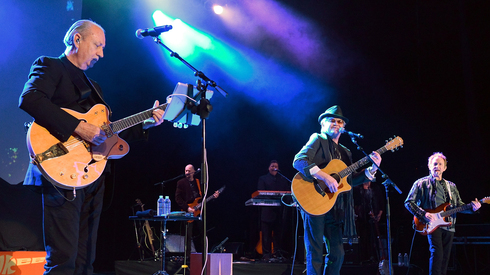The Monkees at Mesa Arts Center
 By Ed Masley The Republic | azcentral.com Sat Aug 3, 2013 11:27 AM
By Ed Masley The Republic | azcentral.com Sat Aug 3, 2013 11:27 AM
The unexpected death of Davy Jones in February 2012 marked the end of an era for many fans who’d grown up watching Jones go from playing a rock star to being a rock star on “The Monkees,” TV’s answer to the Beatles’ film “A Hard Day’s Night.”
But his death at age 66 also marked a new beginning for the three surviving Monkees. Micky Dolenz, Peter Tork and Michael Nesmith are headed to Mesa this week on a reunion tour that grew out of wanting to do a memorial concert for their friend and former co-star.
We caught up with Dolenz, who reflected on Jones, the tour, the TV show and “Headquarters,” the first album the Monkees could truly call their own.
Question: How does it feel to be taking the tour back on the road?
Answer: Well (laughs), I hardly know anything different. It’s like asking, “What’s it like being home?”
Q: Michael hasn’t always been involved in Monkees tours. How did it come to pass that he’s on board this time?
A: Well, you’d have to ask him that. But Michael, after the original Monkees show and touring and recording, started a production company, Pacific Arts, which he still does. And over the years, he did come out and perform. He was at the Greek Theatre back in the ’80s. And then in ’97, we had a quite successful tour of the U.K. But mainly, he just hasn’t felt like performing live. Then, after Davy passed away, we got together to do a memorial and talked about doing a memorial concert, which sort of expanded into 12 concerts back in November. I think Mike just started having a really great time. I think he was very pleasantly surprised by the wonderful reaction he’s been getting from the fans.
Q: Has the memorial aspect of the shows you did last year carried through to this tour?
A: Not as much. Because it’s been a year and a half now. We think about him all the time. And there are some references and photographs and a couple of songs. So, yeah, he’ll always be remembered. If you saw the show in November, that actually wasn’t the Davy Jones Memorial Concert, either. But we definitely did pay homage, and we’re doing it again.
Q: Was it a bittersweet experience going out as the three of you after his death?
A: Definitely. It was tough to get through some of it at times. And he’ll be sorely missed. He’s like my brother. I probably spent more time with him than I did some of my siblings.
Q: Do you recall your reaction when you heard he had died?
A: Yeah, I was stunned. I was in New York, actually, working on a musical. And that whole period of time is a blur. It came as such a surprise. It’s like getting hit by a bus. And there are still times that I’ll think about him and want to give him a call or send him an e-mail and it’s like, “Uhh, no, that’s not going to happen.”
Q: How do you go about choosing a set list at this point?
A: Well, the set list over the years has always been somewhat dictated by the fact that we had so many hits. We have to do all those big hits. I sang most of them, of course. So that hasn’t changed. And with Mike coming back on board, of course, it’s given us the opportunity to sing a lot of the tunes that he sang. And Peter gets a chance to sing some stuff. We’re doing a lot of songs from “Headquarters,” the first album where we managed to get all the musical control, and also from the movie “Head.” We do, obviously, a couple of tunes that David sang. And we have so much video and so much footage from the television show and stills and documentaries, it’s quite an audiovisual multimedia production because we always did that, right from the get-go. In fact, if I’m not mistaken, we were one of the first acts to bring a full-blown motion-picture screen with a giant film projector on the road with us. In 1967.
Q: What do you think of the TV show?
A: You know, I don’t remember much of it subjectively. Mike and I were talking about this the other day. We looked at some of those old scenes and we were like, “Who was that guy?” I mean, I was 20, 21 years old.
Q: What about the recordings? Is there anything that stands out in your mind as something you’re especially proud of?
A: Well, yeah, it would be “Headquarters,” because I’m sure you know the story. We had little or no control over what was being recorded in the beginning. And that’s not to say I didn’t like the stuff. I did. And I still do. Some of those songs written by Boyce and Hart, Carole King, Neil Diamond, Harry Nilsson, Paul Williams, David Gates, and Mann and Weil, it was incredible material. But Mike, especially, and Peter wanted to be more involved in the creation and the writing. We had absolutely no control over what was recorded or released or anything, until “Headquarters.” And from then on, it was some of the best stuff.
Reach the reporter at ed.masley@arizonarepublic.com or 602-444-4495. Twitter.com/EdMasley
 Follow us
Follow us Join us
Join us


